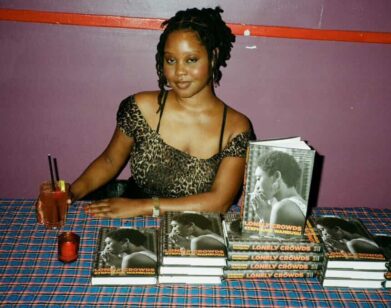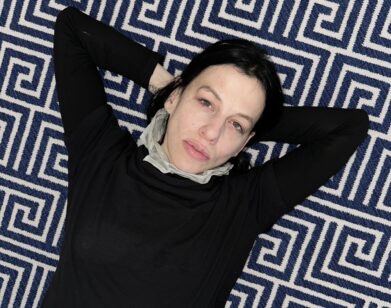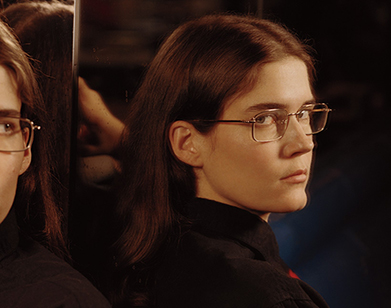LIT
Isabelle Graw and Eliza Douglas on Freud, Fear, and Friendship
“I usually have this rule that I don’t become friends with students,” the writer, art historian, and professor Isabelle Graw told the painter and Balenciaga muse Eliza Douglas over Zoom. “In our case, you were a student, but not really my student, so I allowed for something that I’m very careful not to do, which is a friendship.” Friendship is not only what has blossomed between them, but a chief intellectual preoccupation of Graw’s, whose latest book, On the Benefits of Friendship, explores the phenomenon through a series of semi-fictionalized, diaristic fragments, pulling from the writer’s own experiences as an up-and-coming critic in the cutthroat Cologne scene of the late 80s and 90s. “As an art historian, I’ve always been interested in how friendship-based networks are the precondition for artistic production,” added Graw, a professor at Städelschule in Frankfurt, where Douglas studied for two years. “Artists are never loners, and art doesn’t fall from the sky.” Earlier this month, the pair discussed academia and the art world, the perils of writing about friends, and Graw’s attempt to demystify friendship.
———
ISABELLE GRAW: Hey Eliza, let’s go.
ELIZA DOUGLAS: It’s cool that this is in Interview magazine because it’s so culturally broad. You’re most often in contexts that are art-world related, where you’re so well-known. When people ask about what you do, where do you usually start?
GRAW: It’s a question that’s always very difficult for me to answer. I must admit that it varies according to who asks. I’ve come to say often that I’m a writer and that I write both art history, art criticism, and fiction. If I’m at the doctor, I might say I’m a publisher, because this is a context where the publisher implies more authority. Sometimes I would even add curator because I have recently started to curate shows. If it’s a more scholarly environment, I might mention that I’m a professor. So it depends, but the thread that runs through all my activities is writing.
DOUGLAS: Do you have daily writing practice? The text you published before the most recent one, On the Benefits of Friendship, is your diary entries collected.
GRAW: Yeah, I [have been writing in] a diary on a daily basis since I was eight years old. That’s why writing, for me, is second nature. But when it comes to these books that I’ve written more recently, like In Another World and now On the Benefits of Friendship, they might have a diaristic sound to them, but they’re constructed in very different ways. In Another World consists of fragments or miniatures that are very dense and carefully written and are trying to allow for analytical observations of developments that would not enter into my art theoretical writing. In Another World was written between 2014 and 2017, where a lot of paradigmatic shifts happened on a political level with Brexit and Trump and Me Too, but also on a personal level for me because both of my parents died. So In Another World is both a labor of mourning and an attempt to come to terms with a totally different world that I found myself in. Whereas, in the friendship book, I constructed a fictionalized diary, so the dates that you find in this book are not the real dates. It’s all slightly shifted and exaggerated, and I wanted this “I” that speaks to be grounded in my friendship experiences but also to be rather abstract and more like a general “I” that people could maybe identify with. I wanted to not only report on complicated transactional friendships, but also think about friendship in a more cultural-critical theoretical way.
DOUGLAS: I watched a talk that you did with Lynne Tillman and Avery Singer. Throughout, there were multiple times where aspects of the book were taken as real life occurrences, despite the fact that it’s so emphasized that it’s not. Why do you think that people have this urge? If you were a man writing this book, would you have to have disclaimers to such a degree?
GRAW: People who know me have a strong desire to read this book as a roman à clef, where all the protagonists refer in a one-to-one fashion to friends. But of course, this is really not the case because I try to invent figures that are hybrids of many different people. Traditionally, if you look at the way artworks by persons who identified as women were received, there was a tendency to jump to the lives of these female practitioners. It’s a reductionist tendency to confuse product and person and to not allow for the autonomous dynamic of an artwork and to be much more interested in the person behind it. I am branded as an art theoretician and art historian and then I decided to conquer new territory, the literary field. This is something people are not so willing to accept, especially from women. I even had friends, or so-called friends, who said to me, “This is not literature,” in order to denigrate it as if it was only autobiographical. There is this tendency to say, “This is just Isabelle complaining about difficult friendships and betraying her friends by dragging them into this endeavor.”
DOUGLAS: The text is so self-reflective and meta. It’s interesting that the effects of the writing itself are woven into the book. Your friendships are being affected as you’re writing it and sharing it with people.
GRAW: This meta reflexive prose was very deliberate. It was very important to me that the protagonist is not a self-righteous “I,” always the better friend, the true friend. I didn’t want to opt for a voice like that. I wanted a voice that is as compromised as everybody else and admitting to that. I’ve always liked books that refer to the difficulty of their making and to the reception they get. I rewrote the book a lot and tried, with every rewrite, to push it further away from the autobiography. Of course, due to the fact that certain friendships in my life were woven in, there was a lot of fear. I was not sure for a long time if I would even publish it. I was thinking of publishing only posthumously in order to spare my friends an uncomfortable experience. A friend of mine, the artist Andrea Fraser, said to me, “If there are so many sleepless nights and you’re so anxious about this, this means it matters.” And that convinced me to go ahead.
DOUGLAS: We met because I was a student of yours in Frankfurt, and I was wondering about the school [Städelschule] compared to the art world. Has it always been a direct reflection of it, or a microcosm of it? Or is it quite different? Have you noticed the nature of students change a lot?
GRAW: I usually have this rule that I don’t become friends with students. In our case, you were a student, but not really my student, so I allowed for something that I’m very careful not to do, which is a friendship. You were more like a colleague. I consider my seminars as not completely closed to what’s going on outside, but we negotiate the relationship between inside and outside so that we can experiment according to our time and needs in a way that would not be possible in other spheres of this art economy.
DOUGLAS: It was such an insular little bubble and sometimes, students would stay there for many years. There was this real duality I experienced of this anxiety hovering in the background, but also a real separation from it.
GRAW: It’s also something that I deal with in the friendship book, because I’m interested in the times when you are supposed to cooperate with someone who’s also your rival. How do you navigate when you like someone, but you also want something from them? To come back to Städelschule, you’re right, it’s very insular. We don’t have a MA/BA structure, so there’s more freedom, which has advantages and disadvantages. Especially nowadays, when society is so individualized and people are so isolated from one another, I think that maybe it would be important to provide more structure.
DOUGLAS: Going back to friendship, how did you come to write the book in the first place? How did you land on the topic?
GRAW: As an art historian, I’ve always been interested in how friendship-based networks are the precondition for artistic production. If you look at artistic production say, in the times of the historical avant-gardes, it’s very clear that you always deal with an artistic formation. Artists are never loners, and art doesn’t fall from the sky. It needs friendship-based formations where things are discussed, where things are controlled to a certain degree, where there’s a whole group of people who agree that something is at stake in their work. I was also interested in tackling friendship because friendship is one of the last mystified places. Romantic love has been demystified for many, many years, for many reasons. There have been authors like Eva Illouz, who famously demonstrated that love and economic interests are never far from one another. But people hold on to a very idealistic notion of friendship. There’s also the need to look at the dark flip side of friendship, to look at friendship in a way that allows for phenomena such as “frenemies,” for instance, to come to the foreground. Due to the many changes in my life, possibly starting with having a daughter, my friendships went through a lot of mutations and changes. I wanted to have a space where I could reflect on that.
DOUGLAS: I would love to know about any interesting reactions from friends to the book, or a friendship that was perhaps strengthened.
GRAW: That’s a good question. There were two typical reactions. There were friends who were very disappointed to not find themselves in the book, thinking that they were not important enough for me. I often had to point to characters that contained some of them. Then there have been friends who were upset about the way that they thought they appeared in the book, even they projected themselves onto a character that was not them. I had some friends, very few ones, who were quite upset about the book and thought that it was really hard, but no disaster occurred. Often, if you write a book, you are the last one to hear what people think about it. It’s not like all your friends and acquaintances come to you and want to talk to you about their book. Also, people read much less, so I can’t even assume that they have read it. Especially with friends, there can be a tendency to ignore or silence what you do, to not look at it for reasons of competition or disinterest.
DOUGLAS: When you felt like that was happening, did you ask any friends about it?
GRAW: No, I stopped that a long time ago. In my early days, I was much more upfront asking friends and colleagues, “What did you think about my text?” I hated so much that people said so little, so I tried to force it. I’ve learned since that that’s not a very sovereign way of operating.
DOUGLAS: The upcoming book, about fear and money, how did that come to be?
GRAW: It’s hard to say. Fear is a topic that has interested me for a long time. From a psychoanalytic perspective, I’ve been interested in Freud’s theories on fear and also Melanie Klein’s ideas on persecutive fear. And the money part, the two are somewhat interconnected. You could say, on the one hand, that money reduces fear, but I guess that’s an illusion. On the other hand, money, or the lack of it, is of course one of the most fear-inducing conditions. It was a very spontaneous thing, and I just liked the sound of it in German, Angst und Geld (Fear and Money). And then I had this other idea, because I read Arthur Schnitzler’s novella, Lieutanant Gustl, which is an inner monologue. And I always think about the form first with each book. I thought this was a form that would suit me, the inner monologue, then I started and it just had its own life. I was very, very influenced by Kafka and also by Proust for this book and the sound of it. It’s a very intense stream of anxiety.
DOUGLAS: I’m excited to read it.
GRAW: Thank you so much. You’re a born interviewer.
DOUGLAS: I’m really honored that they asked me.




